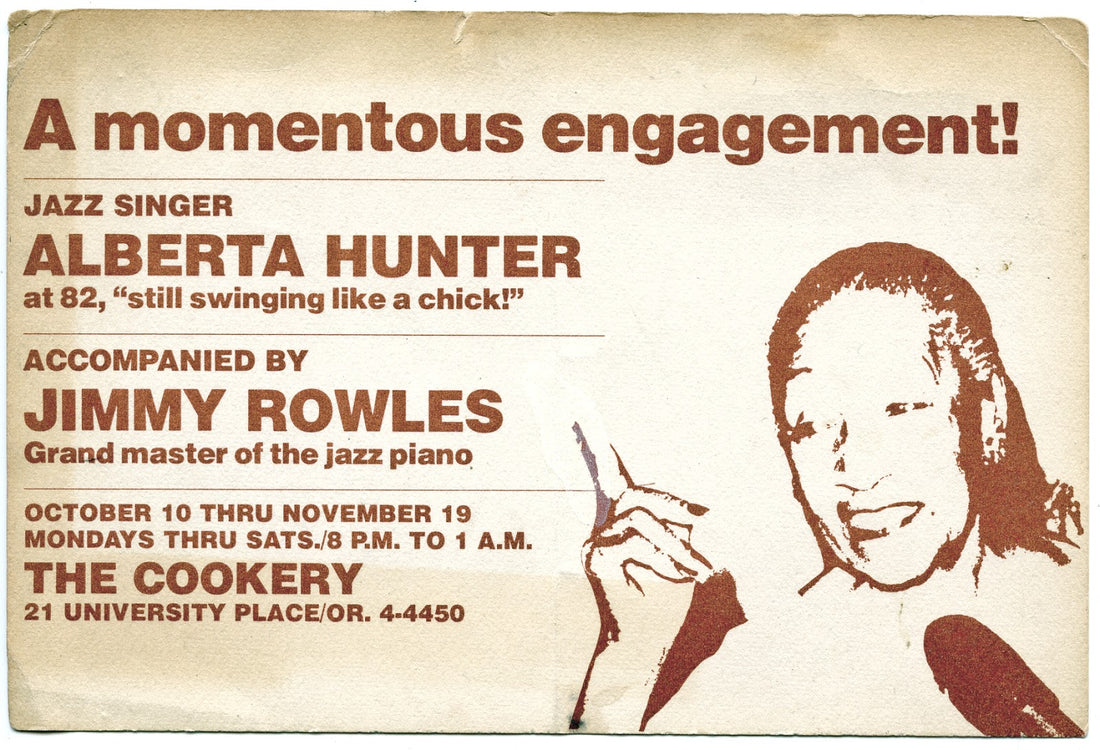“God bless you honey, God bless you”, said Alberta Hunter to my mother.
Greenwich Village in the seventies was dirty and gritty. Crime was rampant and bodies floating in the Hudson River were not uncommon. It also had a thriving cultural and music scene. Within walking distance from Washington Square were some of the greatest music venues in the US. There was the Bitter End, the Bottom Line and Village Gate on Bleeker St. The Village Vanguard on 7th avenue featured artists like Dexter Gordon and Woody Shaw. Max Roach the drummer also played there. I had the pleasure of meeting him at a Stereophile Hi-Fi show many years later. I offered him a shot of malt whisky but he declined because he was, “On the wagon”.
One of the most famous clubs was The Cookery on Eighth St. and University Place. It was a New York institution. Barney Josephson, its owner, had a couple of cabarets in the 1940s called Café Society, which featured all the jazz greats of that time. These clubs were the first in New York to allow black and white patrons to mingle in the audience. In the fifties, after his brother Leon refused to answer questions about his possible communist sympathies when he came before The House Committee on Un-American Activities; Barney was attacked in the press, business dropped and he had to sell his establishments. He then opened a small chain of restaurants and eventually ended up with just one, the Greenwich Village Cookery. In the late sixties at the urging of the jazz pianist Mary Lou Williams, he decided to add musical performances to the restaurant. My wife and I moved to Greene St. in 1976. Our apartment was a block away from the Cookery so from time to time we would go there to hear music.
Among the stellar musicians we saw were Big Joe Turner and Teddy Wilson, both celebrated jazz pianists. After Teddy Wilson’s performance a friend of ours, whose father used to sell pianos and knew many of the famous pianists of the era, introduced us to him. We hung out as he told us stories of the bands and musicians he had worked with in the past. We also heard the world-renowned harmonica player Larry Adler (also like Barney, a victim of the blacklist who left America for Europe and made a career there). He was very popular in the UK when I was growing up and I was a big fan. My wife, Rita approached him to do an interview; she had a show on radio station WBAI at the time.
A block up from the Cookery on University was the Knickerbocker Café. We would sometimes go in there for a drink. One afternoon there was an old black guy on the piano. His playing was remarkably good, way above the standard of ordinary bar musicians. At one point I asked who he was and someone said, “Eubie Blake” This did not ring a bell with me as I’m from Glasgow, but after a little investigation I found out that he had been at one time a successful and sought after performer and composer in the early decades of the 20th century. He was known for songs like, “I’m Just Wild About Harry”, “Memories Of You” and “Charleston Rag”. A gifted storyteller, he was a chain smoker with a wry sense of humor. He said, “If I had known that tobacco was bad for you, I would have given up smoking eighty years ago”. He was ninety-eight and died at one hundred.
By far the biggest star we saw in the Cookery was Alberta Hunter. Her career spanned more than four decades until her retirement in 1957. She talked onstage about how she felt compelled to help other people and decided to become a nurse. She forged a high school diploma and claiming to be 50, entered nursing school at 63. She worked as a nurse until she was forced to stop working because the retirement age was seventy. (She was actually eighty-three). At a party she was introduced to Barney Josephson, who after hearing her sing signed her up for a two- week stint. It lasted six years. This led to a recording contract with Columbia records.
We had already seen her once or twice when my parents made their only visit to the US; we booked a table. She sang with heartbreaking strength and authentic emotion. Towards the end of the set she said she was going to sing a song that was taught to her by her old friend, Sophie Tucker. My mother was a big fan of Sophie Tucker and knew all her songs in Yiddish. Alberta started to sing, in Yiddish, “My Yiddishe Momme”. When she finished singing, my mother, with tears in her eyes, stood up, walked on stage and gave Ms. Hunter a hug. Alberta said: “God bless you honey, God bless you”.



